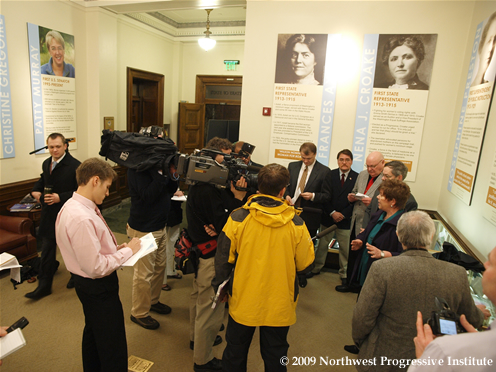The January 25th, 2010 edition of BusinessWeek (one of the few publications I subscribe to) features an incredibly rich illustration of two men standing back to back, each holding mobile phones in their hands.
One man is wearing a black turtleneck shirt, the other a blue dress shirt with a red power tie. Both have serious expressions on their faces, and are looking downwards, towards their handhelds.
The two men are Apple's Steve Jobs and Google's Eric Schmidt. They, and the companies they lead,
as BusinessWeek's cover story explains, are increasingly becoming rivals in every possible sense. A decade ago, Google was just a search engine, and Apple was a computer maker just starting to find its footing after having badly stumbled through the 1990s. But today, the two giants of Silicon Valley are at odds, mostly because Google continues to "enter more of Apple's core businesses" as Jobs diplomatically put it last year.
Google's ambitions seem to know no bounds. The number of products and services the company has launched just since in the last half of this decade (which began in 2001 and will end with the arrival of 2011) is staggering.
Google's products have been explicitly designed to provide a bigger and more dangerous window into the lives of users. Through its search engine it can log queries. Through Google Analytics, AdSense, and widgets embedded on countless websites, it can quietly track surfing behavior.
Through Google Checkout it can obtain and store credit card numbers. Through Google Talk, Google Voice, and Gmail, it can monitor personal communication. Through Android and the Nexus One, it can capture mobile phone numbers. Through applications like Latitude and turn-by-turn maps, it can discern a user's location. Through YouTube it knows what people are watching and what they like to watch. The forthcoming Chrome OS will automatically upload copies of anything on a drive that's plugged in to Google's datacenters.
Then there's Google's plot to get its hands on millions of orphaned books.
I could go on. And on. Google's endgame seems to be a world in which we connect to it to do everything... a world without user privacy and a world in which there is no competition. Forget choice in the marketplace. How about no marketplace at all? Think about it. A person who avails herself of every product and service Google has to offer simply isn't going to spend much time anywhere else. There's no need.
Don't forget that Google has its own social network (Orkut) its own wannabe Wikipedia (Knol) and its own network of blogs (powered by Blogger).
Google's "cloud based" office productivity suite, Google Docs, is slowly morphing into what many tech bloggers are calling GDrive;
the company is now allowing users to store up to a gigabyte of data (with more storage space to come) and a wide array of different filetypes are now supported.
Part of what makes Google so cunning is that they have maliciously subverted free software (i.e. GNU/Linux) to further their own ends.
To understand how they can get away with this, an understanding of free software is required. The philosophy behind free software is as follows:
Free software is a matter of the users' freedom to run, copy, distribute, study, change and improve the software. More precisely, it means that the program's users have the four essential freedoms:
- The freedom to run the program, for any purpose (freedom 0).
- The freedom to study how the program works, and change it to make it do what you wish (freedom 1). Access to the source code is a precondition for this.
- The freedom to redistribute copies so you can help your neighbor (freedom 2).
- The freedom to distribute copies of your modified versions to others (freedom 3). By doing this you can give the whole community a chance to benefit from your changes. Access to the source code is a precondition for this.
Free software licenses aim to maintain these essential freedoms by requiring improvements and modifications to be released under the same license.
But most licenses have a loophole that allows companies like Google to keep the modifications they make to themselves as long as they don't redistribute the software. In other words, Google can use modified free software to power its products and services running on its own servers, but withhold the modified source code.
The Affero GPL addresses and closes this loophole, but it is not yet in widespread use. Naturally, Google doesn't want it to be.
Microsoft veteran Keith Curtis has accurately described Google as "a black hole of free software: innovation enters but never leaves."
Those who scoff at the notion that Google wants to replace the Internet with a Googlenet aren't paying attention. What else explains Google's activities? Why is a search and advertising company invading so many product categories?
Every giant for profit company aspires to be a monopoly, and attaining total domination of an industry is not as formidable an objective as it may seem. Throughout American history there have been a considerable number of successful monopolies, many even aided and abetted by the government.
Who has the power and the clout to check Google's invasive growth? Certainly not public interest organizations.
The Electronic Frontier Foundation and
EPIC are excellent watchdogs, but they don't have regulatory authority. The federal government (and the states, to some extent) do, but there's no guarantee they will act (although they should, and should be pressured to).
There is, however, another force out there that has the potential (notice I used the word potential) to check Google, and that is Google's competition.
Who are Google's strongest competitors, at this point? Microsoft and Apple. Each company seems to have now independently come to the conclusion that Google is its worst enemy. And they're absolutely correct.
There's an old saying that
the enemy of my enemy is my friend. Since Google now represents the biggest threat to Microsoft and Apple, it makes a lot of sense for the folks who run the show in Redmond and Cupertino to start viewing each other as allies. Undoubtedly,
that is what has led to the recent rumored talks to make Bing the default search engine on the iPhone and possibly Safari.
Apple may at some point want to develop its own search engine, but in the meantime, it is certainly not in its best interest to be helping Google.
Apple and Microsoft are already closer than one might think. They each build software that runs on the operating system distributed by the other (Office for Mac in Microsoft's case, QuickTime and iTunes in Apple's case).
Additionally, Apple offers Base Camp to Mac users, enabling Microsoft Windows to run alongside Max OS X on Apple-built computers.
Together, Apple and Microsoft could make a powerful alliance, with the resources and the ingenuity to successfully take on Google, which has staked out a reputation as the company most hostile to user privacy in the history of technology.
It's true that Apple and Microsoft are no angels themselves; their privacy practices leave a lot to be desired.
But they are not the endemic threat to privacy that Google - or should I say Big Brother - is.
Anyone reading this post who uses Firefox can see what I mean. Just install the
NoScript add-on (one of the
ten best for Firefox) and start surfing. Click on that little "S" icon in the bottom right corner, and see for yourself just how many websites have Google code embedded. It's a lot. Even the Seattle Public Library - which should know better! - uses Google Analytics.
Apple and Microsoft will certainly be doing what's best for their own futures by teaming up to take on Google. But they'll also be doing netizens worldwide a valuable favor. If they're really smart, they'll even incorporate better privacy safeguards in their own products and services, providing a stark alternative to Google's increasingly invasive offerings.







